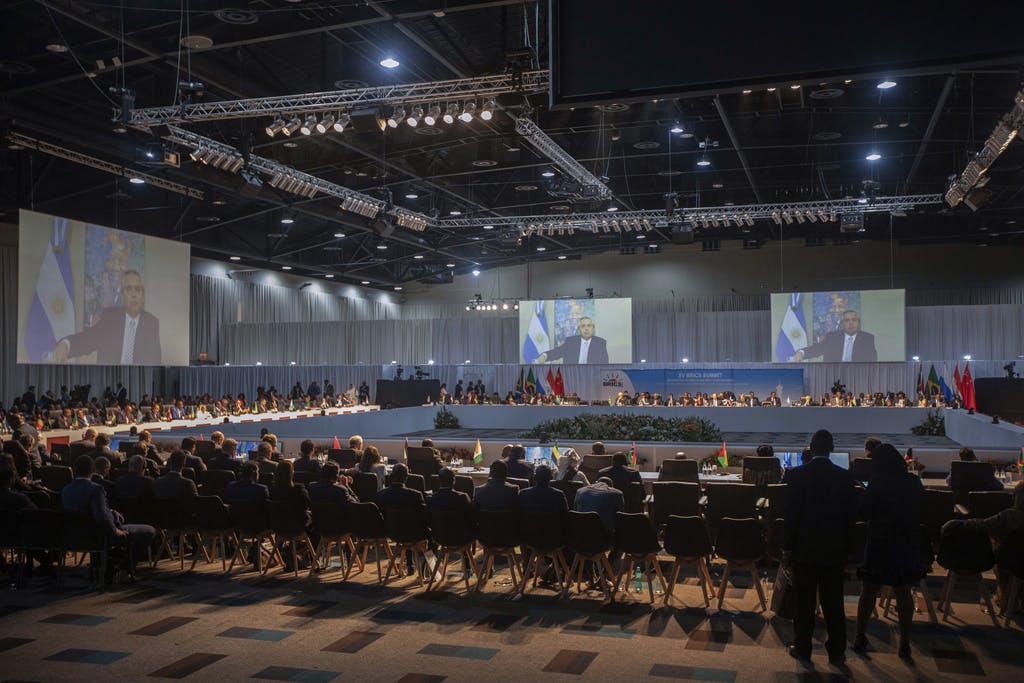Argentina’s Leading Presidential Candidates Oppose Brics Membership
As elections in Argentina loom, the country’s admission into Brics might fall out as the leading right-wing candidates refuse to become part of the group.

Leading presidential candidates at Buenos Aires are pushing back against joining a Beijing-led grouping known as Brics, which on Thursday offered an invitation for Argentina to join in.
Two conservative presidential candidates, Javier Milei and Patricia Bullrich, say they are uncomfortable with Brics members and confirmed they would break relations with them if elected in the presidential elections in October. Ms. Bullrich quickly notified the country that, under her government, Argentina would not be a part of Brics.
“We believe in an international order based on rules to preserve peace and respect for international law,” Ms. Bullrich said hours after President Fernandez of Argentina confirmed the country’s entrance into Brics. The group’s founding members — Brazil, Russia, India, Communist China, and South Africa — voted Thursday to admit six new countries.
Among the new entrants is the Islamic Republic of Iran, a country that has left “open and deep wounds” in Argentina, Ms. Bullrich noted. She is referring to the 1992 bombing of the Israeli Embassy at Buenos Aires and the 1994 bombing of the Jewish community center, AMIA, which was the deadliest terrorist attack in the country’s history. Both attacks were linked to Iran.
Ms. Bullrich and Mr. Milei are worth listening to: They lead the polls in Argentina’s October 22 presidential election. According to a poll conducted by CB Consultora, 52.1 percent of respondents said they would or could vote for Mr. Milei. Ms. Bullrich received 47.4 percent support in the poll. The candidate for the governing left-wing party, Sergio Massa, now the minister of economy, received 34.9 percent.
In addition to Argentina and Iran, Saudi Arabia, the United Arab Emirates, Egypt, and Ethiopia were invited to join Brics on Thursday. China and Russia have long encouraged the enlargement of Brics, which also includes Brazil, India, and South Africa. They hope to rebalance the world order and reduce the influence of the West.
“This membership expansion is historic,” China’s Communist Party chairman, Xi Jinping, said. “It shows the determination of Brics countries for unity and cooperation with the broader developing countries.”
At the same time, President Putin, who attended the summit remotely because he is facing war crime allegations, said that while Brics is not competing with anyone, “it’s also obvious that this process of the emerging of a new world order still has fierce opponents.”
The six newly admitted countries are slated to officially become Brics members on January 1. President Ramaphosa of South Africa said the group has begun a new chapter to “build a world that is fair” and inclusive. Thursday’s announcement of new members is merely the “first phase of this expansion,” he added.
Mr. Fernandez celebrated Argentina’s admission to Brics through a video shared via his Twitter account. “A new scenario is opening for Argentina,” he said. “We have joined the alliance of the most important countries of emerging economies.”
A libertarian presidential candidate, Mr. Milei has previously voiced his opposition to dealing with members of Brics such as China and Brazil and said he would break ties with both countries if elected. Argentina will not be doing “business with communists,” Mr. Milei said last week in relation to Beijing.
Mr. Milei’s attitude toward China is “exceedingly rare” these days in South America, the director of the Latin American Program and the Argentina project at the Wilson Center, Benjamin Gedan, tells the Sun. “It is more common to bend over backward to flatter Beijing in the hopes of attracting Chinese investment and preserving access to China’s enormous market for South America’s commodity exports,” he says.
Mr. Milei said he would not promote relations with Venezuela, Cuba, Nicaragua, or China, and instead would strengthen its ties with the “world’s democracies” such as America and Israel. Mr. Gedan says it remains to be seen if Mr. Milei would keep his position against China if elected, as Beijing is Argentina’s largest trading partner.
Mr. Milei also spoke against the Brazilian president and rejected the possibility of negotiating with Brazil. The Argentinian candidate said in May that President da Silva was a “wild lefty supporting dictators that violate human rights, autocrats with their hands stained with blood.” He also said he would dissolve the Southern Common Market, known as the Mercosur.
Mr. Milei’s party, Liberty Moves Forward, won 30.2 percent of the vote in the primaries in Argentina this month. The two candidates for the right-wing United for Change, Patricia Bullrich and Horacio Rodriguez Larreta, won a total of 28.2 percent. Ms. Bullrich received the most votes and will face Mr. Milei in the October 22 general election.
The governing left-wing Union for the Homeland came in third and summed up at only 27.1 percent. Mr. Massa will be the face of the party and compete against his right-wing counterparts.

